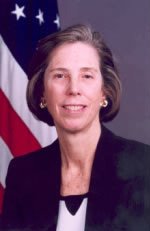
Red the full text of Ambassador Oliver's statement to the Executive Board of UNESCO on October 6, 2006.
Excerpts:
I assume that we all agree that our work must be guided by the democratic principles upon which UNESCO was founded 60 years ago: universality, diversity, justice, dignity, tolerance, respect for human rights and the rule of law—all essential ingredients for world peace.
I hope that we also agree that our work should be guided by the World Summit Outcome Document so that we do not duplicate work being done by other UN organizations......
In regards to both the Natural and Social and Human Sciences Sectors, we feel that we must be careful not to pre-judge the work of the Science Review Panel, but should instead await the outcome of their review before making decisions on overarching and strategic objectives for those sectors.
However, the United States would like to see UNESCO continue its strong commitment to the Intergovernmental Oceanographic Commission (IOC). Given its important role in disaster risk mitigation and in the expansion of the tsunami warning system, the IOC rightly belongs among the strategic program objectives, as does the Intergovernmental Hydrological Program (IHP). Even though 23 international organizations claim competence in fresh water issues, we must ensure that the IHP remains the pre-eminent international organization devoted to potable water and associated ecosystems......
Given the close relationship between knowledge and development, we would like to see the Communication and Information Sector continue its commitment to the free flow and exchange of information through media freedom, and media development programs that strengthen good governance, civic participation, transparency, and accountability. All of these are recognized in the World Summit Outcome Document as key components of sustainable development......
I find it curious that the last of the overarching objectives in the draft Medium Term Strategy is “fostering mutual understanding, reconciliation and peace.” This is truly an intersectoral objective that lies at the heart of UNESCO’s work. This is a pre-eminent reason why UNESCO was established. This is why we still look to UNESCO to propose ideas to address the hatred, misunderstandings, and conflicts that still plague us sixty years after the Organization’s founding. This is an area where UNESCO’s role as a kind of UN “think tank” needs to be brought fully to bear.....
As far as the budget is concerned, the comparative budget document distributed by the Secretariat shows that, thanks to the return of the United States, UNESCO’s budget rose from $544.4 million for the 2002-2003 biennium to $610 million for the 2004-2005 biennium. This large increase should be kept in mind as we discuss issues relating to the budget.
No comments:
Post a Comment